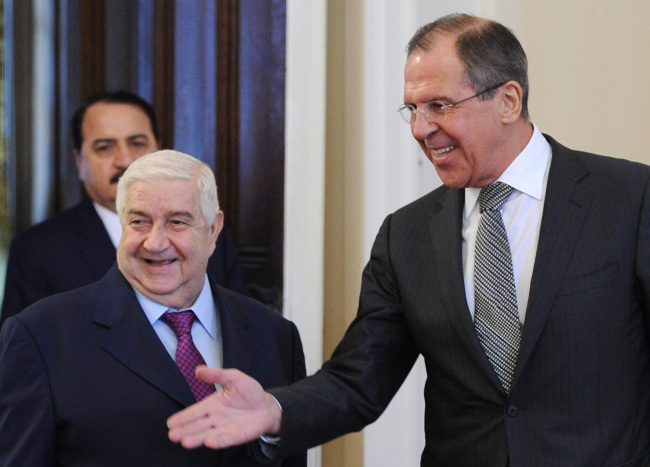MOSCOW (AFP) ― The Syrian regime is ready for talks with armed rebels and anyone who favors dialogue, President Bashar al-Assad’s foreign minister said in Moscow on Monday, in the first such offer by a top Syrian official.
Foreign Minister Walid al-Muallem was in Moscow for talks with Russian counterpart Sergei Lavrov, whose country is one of the few big powers to still maintain ties with Assad’s regime.
Russia has renewed calls for rebels and regime to engage in direct negotiations to end the two-year conflict that has killed tens of thousands of people, warning that pressing for a military victory risked destroying Syria.
 |
Syria’s Foreign Minister Walid al-Muallem (left) and his Russian counterpart Sergei Lavrov pose before their negotiations in Moscow on Monday. (ITAR-TASS-Yonhap News) |
“We are ready for dialogue with all who want dialogue, including those who are carrying arms,” Muallem said at the talks with Lavrov.
Armed rebels have battled the Assad regime since the start of the opposition’s uprising against his rule in March 2011 and now control swathes of Syrian territory.
“We still believe in a peaceful solution to the Syrian problem,” said Muallem, pointing to the creation of a government coalition that would negotiate with both the “external and internal opposition.”
“There is no acceptable alternative to a political solution achieved through agreeing positions of the government and the opposition,” said Lavrov.
Lavrov added that the situation in Syria was “at the crossroads,” with different factions pressing for conflict and talks. But he expressed optimism that a negotiated solution could be found.
“There are those who have embarked on a course of further bloodshed that risks the collapse of the state and society,” he said.
“But there are also sensible forces who are increasingly aware of the necessity to begin the talks as soon as possible to reach a political settlement.”
“The number of supporters of such a realistic line is growing,” said Lavrov.
He warned that there was no point for the sides trying to fight toward a “victorious end” and warned Assad’s regime not to give in to what Lavrov termed “provocations.”
Lavrov had said last week there were positive signs from both sides of a new willingness to talk but called on Assad’s regime to turn oft-stated words about its readiness for dialogue into deeds.
Russia has also been working on agreeing a trip to Moscow, possibly in early March, by the head of the Syrian opposition National Coalition Ahmed Moaz al-Khatib.
The rebels had pulled out of talks with foreign powers in protest at the international community’s inability to halt the bloodshed.
Khatib told reporters in Cairo on Monday that his visit to Russia would be “postponed until we see how things progress.”
After Muallem’s statement on Monday, the Free Syrian Army’s chief of staff Selim Idriss said that before any dialogue could begin, Assad’s regime must fall, among other pre-conditions.
“I am not going to sit down with him or with any other member of his clique before all the killing stops, or before the army withdraws from the cities,” he told pan-Arab broadcaster Al-Arabiya.
The Moscow talks came a day before Russia’s top diplomat meets new U.S. Secretary of State John Kerry in Berlin for the first time, with the Syria crisis topping the agenda.
Kerry urged the Khatib-led Syrian opposition to withdraw its threat to pull out of an international meeting he will attend in Rome on Thursday.
“I would urge the Syrian opposition to join us as a matter of practicality and of informing us,” Kerry told a news conference in London.
“I want our friends in the Syrian opposition council to know that we are not coming to Rome simply to talk. We are coming to Rome to make a decision on next steps,” he said.
Khatib said on Saturday it was pulling out of the 11-nation meeting of the Friends of Syria to protest at the “shameful” inaction of the international community over civilian killings.
But Khatib said Monday that the Syrian opposition would consider participating in the meeting after receiving “specific” promises of support from key nations.
“The leaders of the (Syrian National) Coalition will meet today to discuss promises made by several major countries, which have asked us to cancel the boycott and give clear and specific support for the Syrian people,” he said.
Throughout the conflict, opposition by Russia and its diplomatic ally China has prevented attempts by the West to pass U.N. Security Council resolutions sanctioning Assad’s regime.
The U.N. human rights chief on Monday criticized the Security Council’s failure to take action.
“The Security Council has so far failed with regard to Syria,” Navi Pillay told ministers at the start of a regular U.N. Human Rights Council session in Geneva.
The diplomatic activity came as there appeared to be no let-up in the fighting which according to the United Nations has claimed 70,000 lives since the conflict began in March 2011.






![[Herald Interview] 'Trump will use tariffs as first line of defense for American manufacturing'](http://res.heraldm.com/phpwas/restmb_idxmake.php?idx=644&simg=/content/image/2024/11/26/20241126050017_0.jpg)
![[Exclusive] Hyundai Mobis eyes closer ties with BYD](http://res.heraldm.com/phpwas/restmb_idxmake.php?idx=644&simg=/content/image/2024/11/25/20241125050044_0.jpg)
